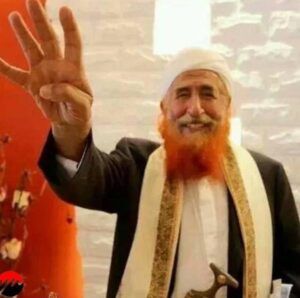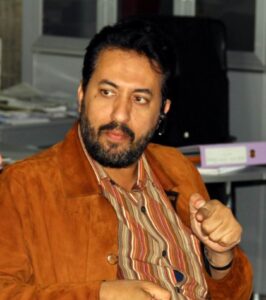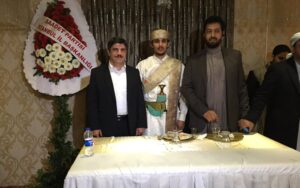Abdullah Bozkurt/Stockholm
Turkish President Recep Tayyip Erdoğan invested in the Muslim Brotherhood network to carve out influence in the war-torn Gulf nation of Yemen and sent a team organized by his chief military advisor to meet with a US-designated terrorist in Sanaa, a Nordic Monitor investigation has found out.
According to the internal records of private military contractor SADAT, which many believe is a de facto paramilitary force loyal to the Islamist president of Turkey, Shaikh Abdul Majeed al-Zindani, a 70-year-old cleric listed as a terrorist by the United States, privately met with a visiting SADAT delegation in Yemen to discuss Arab and Muslim affairs.
Erdoğan’s paramilitary group SADAT, which is led by Adnan Tanrıverdi, a retired officer and former chief military advisor to President Erdoğan, has been functioning as a training and logistical hub for jihadists in Turkey, Syria, Libya and other countries. SADAT reached out to Abdul Majeed’s network in 2014 when it sent a special delegation to Sanaa under the cover of an NGO cooperation scheme.
SADAT’s top deputies Necmettin Keleş, Ali Kurt and Ersan Ergür met with the radical cleric in an unspecified location in Sanaa some time between February 19 and 20, 2014. Keleş is deputy chairman of the board of an organization called the Association for Defenders of Justice (Adaleti Savunanlar Derneği, Asder), a SADAT outfit by another name. Ergür is a board member of the Association of Justice Defenders Strategic Studies Center (Adaleti Savunanlar Stratejik Araştırmalar Merkezi, ASSAM), also a SADAT organization. Kurt’s official title was general secretary of the Union of NGOs of the Islamic World (İslam Dünyası STK’ları Birliği İDSB), a SADAT front organization.
SADAT documented and reported on its delegation’s meeting with Shaikh Abdul Majeed al-Zindani in Yemen:
The private meeting was attended by 10 people in total from the two sides. According to the minutes of the meeting, which covered only a partial conversation and were obtained by Nordic Monitor, Abdul Majeed told the SADAT members that Turkey under Erdoğan’s leadership would soon lead the Islamic world. He remarked that Erdoğan had already been clearing the battlefield and said the Turkish president had been preparing Turkey for a major operation that would take place in the future.
The minutes did not cover all the details but made a note that some of the information gathered by the SADAT team was not put into writing but rather verbally conveyed to Tanrıverdi by the delegation upon their return to Turkey. It suggested that highly sensitive matters were left out for fear of leaks to the media.

In an interview after he resigned as chief military advisor to Erdoğan in January 2020, Tanrıverdi admitted that he personally met with Abdul Majeed and discussed the long-awaited mahdi (prophesied redeemer of Islam), for whom the entire Muslim world is waiting.
“I asked him [Abdul Majeed], ‘Will there be an Islamic Union?’ He said there would be. I asked, ‘When will it happen?’ He replied: ‘When the mahdi comes,” Tanrıverdi said in recounting his conversation with the Yemeni cleric.

Speaking to the Turkish government’s anti-Semitic, anti-Christian mouthpiece Akit TV on December 23, 2019 following a session of the International Islamic Union Congress, organized by ASSAM, Tanrıverdi said his organization had been working to pave the way for the mahdi’s arrival. Althugh he gave up his official title, Tanrıverdi still continues to advise President Erdoğan on military and security matters.
Abdul Majeed cultivated ties with the Islamists in Turkey, especially the late Islamist ideologue Necmettin Erbakan, a mentor to President Erdoğan and the founding father of political Islam in Turkey. Erbakan even financially helped him when Abdul Majeed established Al Iman University in Sanaa. The New York Times revealed the financial links of Abdul Majeed to Turkish Islamists and described the university as “a factory for producing Islamic extremists” that attracted hundreds of non-Yemeni students to its courses.
He was frequently featured in the pro-Erdoğan media in Turkey. According to an interview Abdul Majeed gave to an Islamist publication in May 2013, he said he was praying for Erdoğan.

“If Turkey is with the Europeans, it will have to follow their lead. But if Turkey is with Arabs and Muslims, it becomes their leader, their governor,” he said. The Yemeni Islamist argued that when the caliphate was abolished in Turkey, the decline of the Islamic world began. He clearly saw the opportunity for the Muslim Brotherhood to promote its agenda in the 2011 Arab revolutions, during which the Erdogan government, rooted in a similar Islamist ideology, mobilized resources to support the Brotherhood in Tunisia, Libya, Egypt and Syria. Abdul Majeed called for jihad in Syria to topple the Bashar al-Assad regime, a goal vigorously pursued by President Erdogan as well.
In another interview in October 2013, he asked Turkey to raise the caliphate flag and unite the Muslim ummah.
Although Abdul Majeed moved to Turkey on November 20, 2020, his family members and loyal followers have long resided in Turkey and closely worked with the Erdoğan government to promote the Muslim Brotherhood and other jihadist networks. From time to time, the appearances of his son Abdullah al-Zindani were covered by the Turkish media.
They were rumored to have been laying the groundwork to make moves in the Yemeni conflict when the opportunity presented itself. Yasin Aktay, Erdoğan’s advisor on Turkey’s relations with Arab and Muslim countries, stood next to Abdullah al-Zindani when Abdul Majeed’s grandson got married in Turkey in February 2016. Aktay is among the few in Erdoğan’s inner circle and acts as a coordinator in managing ties with the al-Islah Party and the Association of Yemeni Scholars, both outfits run by the Yemeni Muslim Brotherhood network.

On February 24, 2004 the US Treasury issued an order labeling Abdul Majeed a “Specially Designated Global Terrorist” and submitted his name to the UN Security Council’s al-Qaeda sanction committee
“In this leadership capacity, he has been able to influence and support many terrorist causes, including actively recruiting for al-Qaeda training camps,” the US Treasury said, claiming that Abdul Majeed played a key role in the purchase of weapons on behalf of al-Qaeda and other terrorists.
He was found to have links to Ansar al-Islam (Al), an Iraqi-based terrorist organization linked to al-Qaeda, which is also included on the UN al-Qaeda sanctions committee list.
The US government also highlighted the role of Abdul Majeed’s Al-Iman University in radicalizing youth. “Al-Iman students are suspected of being responsible, and were arrested, for recent terrorist attacks, including the assassination of three American missionaries and the assassination of the number two leader for the Yemeni Socialist party, Jarallah Omar. Notably, John Walker Lindh was also a student at Al Iman University before he joined the Taliban,” the Treasury statement noted.
US Treasury’s announcement designating Abdul Majeed as a terrorist:












